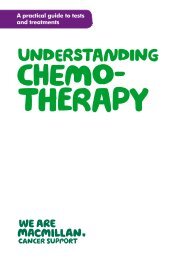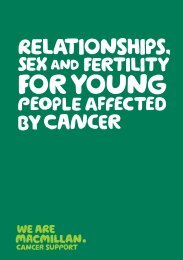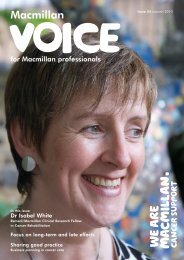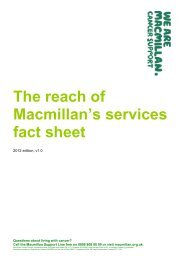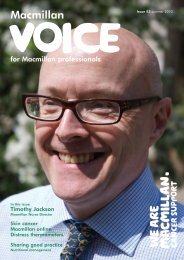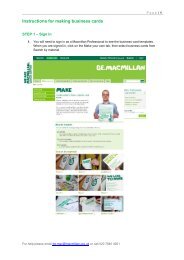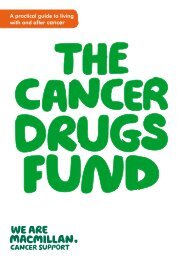Download PDF here - Macmillan Cancer Support
Download PDF here - Macmillan Cancer Support
Download PDF here - Macmillan Cancer Support
Create successful ePaper yourself
Turn your PDF publications into a flip-book with our unique Google optimized e-Paper software.
Move more<br />
Get active, feel good exercise DVD
Get Active, Feel Good<br />
enjoy<br />
your<br />
exercise<br />
What do you think<br />
If you have any feedback on this DVD that<br />
you’re happy to share with us, please email<br />
survivorship@macmillan.org.uk<br />
This DVD features an exercise programme designed<br />
specifically for people living with or after cancer.<br />
Keeping physically active has many benefits, and this<br />
DVD aims to help you do this. It also includes stories<br />
and tips from people who may have been through<br />
similar experiences to you. They describe how they<br />
became active and how this helped them.<br />
Physical activity<br />
and cancer<br />
Whether you’re living with or after cancer, physical activity<br />
can help you make a positive change to your life. It can<br />
benefit you mentally and physically. Many people say it<br />
helps them feel they’re doing as much as they can to stay<br />
strong during treatment. It can also be a way of taking<br />
some control and helping with your recovery. Some people<br />
may want to make positive changes to their lives after a<br />
cancer diagnosis, and taking steps towards a healthier<br />
lifestyle can be a big part of this.<br />
You may be a little nervous about building up your activity<br />
levels, particularly if this is your first attempt to be more<br />
active, or if you haven’t been active for a while. However,<br />
research has shown that being more active can make a<br />
positive difference to your well-being and recovery. T<strong>here</strong><br />
are many ways you can become more active. Even if it’s<br />
just going for a walk, any amount of physical activity is<br />
better than none at all.<br />
Is it safe<br />
You may have concerns about becoming more active,<br />
but being active has fewer risks than being inactive.<br />
As long as you do what’s safe and comfortable for you,<br />
then physical activity can benefit you in many ways. If<br />
you’re unsure about what you can do, ask your doctor,<br />
nurse, physiotherapist or cancer exercise specialist if you<br />
have one.<br />
1
Get Active, Feel Good<br />
The benefits<br />
of being active<br />
Being active during and after treatment can:<br />
• reduce treatment side effects<br />
• improve your quality of life<br />
• reduce tiredness (fatigue)<br />
• give you more strength and make you fitter<br />
• reduce depression and anxiety<br />
• help look after your bones<br />
• help look after your heart<br />
• help you keep to a healthy weight<br />
T<strong>here</strong>’s also some evidence that being active at the<br />
recommended levels and maintaining a healthy weight<br />
may reduce the risk of some cancers progressing or<br />
coming back. This research is relatively new, and we need<br />
more evidence before we can say that this is conclusive.<br />
However, t<strong>here</strong> are some good indicators that being more<br />
active can make a difference.<br />
2
Working while caring for someone with cancer<br />
Get Active, Feel Good<br />
Becoming more active<br />
If you’ve decided you want to become more active, it’s<br />
important to stick to what’s comfortable and safe for you.<br />
Your cancer type, treatment and any other conditions you<br />
have will influence the sort of activities you should do.<br />
If you’re unsure about anything, talk to your doctor, nurse,<br />
or cancer exercise specialist.<br />
T<strong>here</strong> are many ways you can become more active.<br />
It’s important to do an activity that you enjoy and that<br />
fits in with your life.<br />
This could be gardening, walking to the shops, playing<br />
with your children or grandchildren in the park, or going to<br />
a gym session or class with friends. Or it may mean being<br />
more active around your home and reducing the time you<br />
spend sitting or lying down. Using this DVD is one way to<br />
become more active.<br />
4<br />
5
Get Active, Feel Good<br />
How much to do<br />
During treatment, you may not feel up to being very active,<br />
but this will depend on your individual situation and any<br />
treatment side effects. Doing what’s comfortable for you,<br />
even if that’s just going for some short walks or avoiding<br />
being immobile for long periods, can help you feel better.<br />
After treatment, you can try to build up your activity<br />
gradually, working towards the recommended levels if<br />
possible. If you’ve been inactive for a while, it’s important<br />
to start slowly and gradually build up your activity levels.<br />
Set realistic and achievable goals that work for you.<br />
If you’re unsure about undertaking a particular activity<br />
or exercise, contact your doctor, nurse, physiotherapist<br />
or qualified cancer exercise specialist.<br />
Recommended levels of physical activity<br />
In the UK, adults are advised to do at least 2.5 hours of<br />
moderate-intensity physical activity per week. This could<br />
be 30 minutes of activity on five days of the week, which<br />
could be broken up into 10 minutes of activity three times<br />
a day. It’s also advisable to do some muscle-strengthening<br />
exercises at least twice a week. Older adults at risk of falls<br />
should undertake activity to improve coordination and<br />
balance on at least two days per week.<br />
Our booklet Physical activity and cancer treatment<br />
and our Move more pack have more information.<br />
6
Get Active, Feel Good<br />
Get Active, Feel Good<br />
Ted’s story<br />
‘I was diagnosed with cancer in October 2009.<br />
I was quite fit at the time but advised to keep<br />
physically active prior to surgery. I did so by<br />
walking, which I didn’t particularly enjoy, but it<br />
gave me a sense of control. Being fit certainly<br />
helped me through a difficult time in surgery<br />
but even so, on discharge nearly six weeks later,<br />
I was very frail.<br />
As general fitness and strength returned<br />
through regular walking and resistance training<br />
so did my self-confidence. After a few months I<br />
returned to work and then I fulfilled a life‐long<br />
dream – I bought a sailing boat. I’ve retired<br />
now but the boat is keeping me very active!’<br />
‘Keeping<br />
active<br />
helped me<br />
through<br />
a very<br />
difficult<br />
time’<br />
Ted demonstrates the advanced exercises on this DVD.<br />
8 9
Get Active, Feel Good<br />
Get Active, Feel Good<br />
Before using this DVD<br />
If you’re unsure about what activities are safe for you, you<br />
might want to show this DVD and booklet to your doctor,<br />
nurse or physiotherapist if you have one. You can ask<br />
them if t<strong>here</strong>’s anything you need to be cautious about.<br />
Here are some things you may need to consider before<br />
using this DVD:<br />
• If you’ve had chemotherapy, you may have low<br />
numbers of red blood cells (anaemia). This can<br />
make you feel tired and breathless. Your doctor may<br />
advise you to only do day-to-day activities until your<br />
anaemia improves.<br />
check wiTh<br />
your health<br />
professional<br />
• If you have bone thinning or cancer affecting the<br />
bones, you should avoid doing ‘high impact’ exercises<br />
such as running or jumping, exercises that put a strain<br />
on the area of bone that’s affected, or movements<br />
w<strong>here</strong> you could easily fall.<br />
• If your cancer treatment has caused peripheral<br />
neuropathy (nerve damage) that’s affected your<br />
balance, it’s important to avoid activities w<strong>here</strong> you<br />
could easily fall. You could hold onto a chair during<br />
exercise to help you balance.<br />
• If you have lymphoedema, you should always wear<br />
a compression garment during exercise. Build up the<br />
physical activity you do with your arm or leg slowly,<br />
and ask your lymphoedema specialist for advice.<br />
• If you’ve just had surgery or have any wounds that<br />
are still healing, you shouldn’t use this DVD. However,<br />
getting active after surgery is important, so ask your<br />
cancer specialist or specialist nurse for advice on what<br />
you can do.<br />
• If you have any type of line in, or have other health<br />
conditions such as high blood pressure, diabetes,<br />
heart, lung or back problems, you should check with<br />
a health professional before starting this DVD.<br />
Our booklet Physical activity and cancer<br />
treatment also has more information.<br />
10 11
Get Active, Feel Good<br />
Get Active, Feel Good<br />
Some dos and don’ts<br />
before you start this DVD<br />
Do<br />
• Check with your doctor, nurse or health professional<br />
if you’re unsure about whether this DVD is right for you<br />
at the moment.<br />
• Wear well-fitting shoes, such as trainers or flat<br />
comfortable shoes, and loose clothing.<br />
• Drink plenty of water after the DVD or during a break<br />
so you don’t get dehydrated.<br />
• Make sure you have plenty of space around you and<br />
do the exercises on an even, stable surface.<br />
• Have something healthy to eat that includes<br />
carbohydrates about two hours before you start, and<br />
a healthy carbohydrate snack (such as a banana)<br />
within 30 minutes of finishing.<br />
• Make it fun – perhaps you could do the DVD<br />
with a friend.<br />
Don’t<br />
• Exercise if you feel unwell or have symptoms<br />
that worry you.<br />
• Continue exercising if you develop a new pain<br />
or an existing pain becomes worse.<br />
• Continue if you feel dizzy, have chest pain, a racing<br />
heart, breathing problems, or any other sudden<br />
symptoms – stop immediately and contact your doctor.<br />
do HAVE<br />
A HEALTHY<br />
SNACK<br />
12 13
Get Active, Feel Good<br />
Get Active, Feel Good<br />
Getting active<br />
with this DVD<br />
This DVD is designed for you to be able to complete<br />
at home. It provides two to three different levels of<br />
each exercise to give you options depending on how<br />
you’re feeling.<br />
If you’re currently in the middle of treatment and are<br />
feeling tired or having difficulties with balance, or if<br />
you haven’t exercised for some time, you may not be<br />
up to doing all of the sections of this DVD. You could<br />
pick and choose some warm-up or simpler exercises<br />
until you feel better or more confident. You can build<br />
up the number of exercises you do as your energy or<br />
fitness improves.<br />
If you enjoy the DVD and feel able to do the full<br />
60 minutes, you could try building up to doing this three<br />
times a week as part of an active lifestyle. However, any<br />
amount of physical activity will be beneficial.<br />
Once you’ve used the DVD for a while and are feeling<br />
fitter, you may want to consider going to a gym so you<br />
can learn new exercises to increase your strength.<br />
14 15
Get Active, Feel Good<br />
Get Active, Feel Good<br />
What’s included<br />
on the DVD<br />
The programme is made up of four sections that focus<br />
on different things:<br />
• mobility and pulse-raising – this can be done<br />
on its own or as a warm-up<br />
• cardiovascular exercises<br />
• muscular strength and endurance exercises<br />
• flexibility, balance and cool down.<br />
For some exercises t<strong>here</strong> are different ‘levels’, so you can<br />
choose the one that suits you depending on how you’re<br />
feeling. It’s important to exercise with the DVD at the pace<br />
which is right for you – and this may vary on a daily basis.<br />
Level 1 is for if you’re feeling tired or have problems with<br />
balance – many of the exercises are chair-based.<br />
Level 2 is a standing option that you can do with or<br />
without a chair for support.<br />
Level 3 is a more challenging option for when you’re<br />
feeling fitter and stronger.<br />
Equipment<br />
You won’t need any specialist equipment for this DVD. But<br />
using light weights, food cans or small bottles of water will<br />
make some of the strengthening exercises more challenging.<br />
Posture<br />
Try to maintain a good posture throughout this DVD.<br />
This will help you engage the core muscles in your<br />
tummy and lower back.<br />
If you’re sitting:<br />
• Sit forward on the front third of the chair – with your<br />
spine clear of the back of the chair.<br />
• Hips, knees and feet should all be aligned and both<br />
feet planted fully and firmly on the floor.<br />
• Sit up tall, lifting your upper body away from your hips.<br />
• Look straight ahead with shoulders relaxed.<br />
• If your back becomes tired during the exercise take a<br />
short rest by sitting well back in the chair so your back<br />
is fully supported.<br />
If you’re standing:<br />
• Stand with your feet hip-width apart, and your knees<br />
slightly bent so they’re not locked<br />
• Stand up straight, lifting your upper body away from<br />
your hips<br />
• Keep your shoulders relaxed.<br />
16 17
Get Active, Feel Good<br />
Get Active, Feel Good<br />
Mariette’s story<br />
‘When I was diagnosed with breast cancer in<br />
2010, I was devastated. I’d had breast cancer<br />
21 years ago and couldn’t believe I was going<br />
to have to go through it again.<br />
‘Throughout my cancer treatment it was<br />
important for me to carry on competing in<br />
fencing championships. I decided to join a<br />
gym w<strong>here</strong> I followed a fitness programme<br />
designed by my personal trainer. I worked<br />
with him to build up my stamina and<br />
increase my fitness level.<br />
‘Focusing on my physical fitness was one of<br />
the only things that kept me going through<br />
my second experience of breast cancer.<br />
I carried on training and was able to fulfil<br />
my dream of competing at the European<br />
Veterans’ Fencing Championships 2011.’<br />
‘Focusing on<br />
my physical<br />
fitness has<br />
been so<br />
important<br />
to me’<br />
Mariette demonstrates the easier exercises on this DVD.<br />
18 19
Get Active, Feel Good<br />
Get Active, Feel Good<br />
Next steps<br />
Sports organisations<br />
If you’re enjoying being more active but would like to meet<br />
new people, walking is a great option. With Walking for<br />
Health run by <strong>Macmillan</strong> and the Ramblers, you can take<br />
part in a free short walk nearby to help you get active and<br />
stay active at a pace that works for you.<br />
Search for a walk near you at walkingforhealth.org.uk<br />
Walking for Health (England)<br />
www.walkingforhealth.org.uk<br />
020 7339 8541<br />
Paths for all (Scotland)<br />
www.pathsforall.org.uk<br />
01259 218 888<br />
Let’s Walk Cymru (Wales)<br />
www.ramblers.org.uk/letswalkcymru<br />
02920 646890<br />
Walk NI (Northern Ireland)<br />
www.walkni.com<br />
Whether it’s football, tennis or cycling (or any other sport),<br />
the national sports council will be able to give you contact<br />
details for individual sports governing bodies and w<strong>here</strong> to<br />
find facilities near you.<br />
Sport England<br />
www.sportengland.org<br />
020 7273 1551<br />
Sport Scotland<br />
www.sportscotland.org.uk<br />
0141 534 6500<br />
Useful websites<br />
Spogo Sport and Fitness Finder<br />
www.spogo.co.uk<br />
NHS Choices Health and Fitness<br />
www.nhs.uk/livewell/fitness<br />
Active Scotland<br />
www.activescotland.org.uk<br />
Sport Council for Wales<br />
www.sportwales.org.uk<br />
0845 045 0904<br />
Sport Northern Ireland<br />
www.sportni.net<br />
028 9038 1222<br />
20 21
Our Move more partners<br />
<strong>Support</strong> on the high street<br />
<strong>Cancer</strong> is often the toughest fight many people will face.<br />
Boots UK and <strong>Macmillan</strong> are working together to ensure<br />
everyone affected by cancer, w<strong>here</strong>ver they are in the UK,<br />
has access to the best cancer information and support in<br />
their local community.<br />
By improving access and connecting people to <strong>Macmillan</strong><br />
information in Boots stores we will support people affected<br />
by cancer at every stage of their cancer journey and<br />
beyond, in a trusted and familiar environment.<br />
That’s why Boots <strong>Macmillan</strong> Information Pharmacists*<br />
have chosen to receive bespoke training to support<br />
people affected by cancer to deliver personalised cancer<br />
information and support in communities across the UK.<br />
The Boots <strong>Macmillan</strong> Information Pharmacists can show<br />
you how to get more information and support for the<br />
concerns you may have. They can also help connect you<br />
to cancer information services and experts in your local<br />
community, signpost you to wider <strong>Macmillan</strong> services and<br />
suggest to you how to become more active.<br />
You don’t need an appointment to see a Boots <strong>Macmillan</strong><br />
Information Pharmacist; if they are available in your local<br />
Boots Store, they will be able to assist you directly. But if<br />
not available, any member of the Boots pharmacy team,<br />
will be able to signpost you to wider <strong>Macmillan</strong> services.<br />
*Boots <strong>Macmillan</strong> Information Pharmacists are not available in all Boots stores.<br />
To find your local one visit the store locator on boots.com<br />
22
Our Move more partners<br />
Get gardening<br />
Gardening is a great way to enjoy some physical activity<br />
at the same time as adding some colour and shape<br />
to your garden. The National Gardens Scheme (NGS)<br />
is <strong>Macmillan</strong>’s largest single donor donating almost<br />
£14 million to help people affected by cancer since<br />
the partnership began in 1985. The NGS supports<br />
our Move more campaign, promoting the benefits of<br />
gardening and visiting gardens for people’s health,<br />
physical and mental well-being.<br />
George Plumptre, Chief Executive of The National<br />
Gardens Scheme says: ‘At the NGS many people have<br />
shared the health benefits they have experienced from<br />
gardening and we would love to help and improve the<br />
lives of even more people affected by cancer. Being<br />
outdoors is therapeutic and relaxing and can have a<br />
positive impact on your recovery. We have many people<br />
who now open their gardens to raise funds for <strong>Macmillan</strong>,<br />
because they themselves have been helped and want to<br />
share the benefits of their gardens. All our owners look<br />
forward to welcoming visitors to their gardens and giving<br />
hints and tips for them to take away.’<br />
For more information on The National Gardens Scheme<br />
or to find an open garden near you, please visit<br />
ngs.org.uk<br />
24
Get Active, Feel Good<br />
Get Active, Feel Good<br />
When the time is right and you’re feeling stronger, you<br />
may also want to join <strong>Macmillan</strong> for one of our fundraising<br />
activities. You could join one of our UK-based walks or<br />
choose from running, hiking, swimming or cycling.<br />
We couldn’t provide our vital services without the people<br />
who support us. So get involved in your local area, sign up<br />
for an event or organise your own. Whatever you do will<br />
make a massive difference.<br />
‘I decided to fundraise for <strong>Macmillan</strong> by hiking<br />
the Andes Mountains in Peru. It gave me a<br />
goal to aim for during my treatment which<br />
made me extremely positive and focused.’<br />
Michelle, diagnosed with thyroid cancer<br />
Visit macmillan.org.uk/fundraising to find out more.<br />
Get active<br />
and raise<br />
money for<br />
<strong>Macmillan</strong><br />
26 27
Get Active, Feel Good<br />
Useful resources<br />
You may want to order some of these resources from<br />
be.macmillan.org.uk:<br />
Physical activity and cancer treatment<br />
A booklet giving information about being active during<br />
and after cancer treatment.<br />
Move more pack<br />
A step-by-step guide to becoming more active, which<br />
includes an activity diary and practical advice.<br />
Healthy eating and cancer<br />
A booklet about eating a healthy diet after cancer.<br />
National Gardens Scheme<br />
For more information about gardening and the National<br />
Gardens Scheme visit ngs.org.uk or call 01483 211535.<br />
Disclaimer<br />
We make every effort to ensure that the information we provide<br />
is accurate and up to date, but it should not be relied upon as a<br />
substitute for specialist professional advice tailored to your situation.<br />
So far as is permitted by law, <strong>Macmillan</strong> does not accept liability in<br />
relation to the use of any information contained in the publication, or<br />
third-party information or websites included or referred to in it.<br />
Thanks<br />
This DVD and booklet have been approved by our chief medical<br />
editor, Dr Tim Iveson, Consultant Medical Oncologist. It has been<br />
produced by the Survivorship team at <strong>Macmillan</strong>.<br />
With thanks to: Dr Anna Campbell, Lecturer in Clinical Exercise<br />
Science; Nicola Chesman, Senior Physiotherapist; Wendy Makin,<br />
Consultant in Palliative Care and Oncology; Professor Alastair<br />
Munro, Professor of Radiation Oncology; Lena Richards, Senior<br />
Physiotherapist; Dr Karen Robb, Consultant Physiotherapist and<br />
Professor Dr Rob Thomas, Consultant Oncologist.<br />
Thanks also to Ted and Mariette for kindly volunteering their time to<br />
take part in the DVD.<br />
28
When you’re living with and after<br />
cancer, physical activity can help you<br />
make a positive change in your life.<br />
In this DVD, cancer fitness expert,<br />
Dr Anna Campbell, will guide you<br />
through three exercise plans which<br />
you can complete at home.<br />
<strong>Cancer</strong> is the toughest fight most of us will ever face.<br />
But no one should go through it alone. The <strong>Macmillan</strong><br />
team is with you every step of the way, from the nurses<br />
and therapists helping you through treatment to the<br />
campaigners improving cancer care.<br />
Together, we are all <strong>Macmillan</strong> <strong>Cancer</strong> <strong>Support</strong>.<br />
For cancer support every step of the way<br />
Call <strong>Macmillan</strong> on 0808 808 00 00<br />
(Monday to Friday, 9am-8pm)<br />
or visit macmillan.org.uk<br />
Kindly supported by<br />
5 045091 529929<br />
© <strong>Macmillan</strong> <strong>Cancer</strong> <strong>Support</strong>, March 2013. 1st edition. MAC14016.<br />
Next planned review 2015.<br />
<strong>Macmillan</strong> <strong>Cancer</strong> <strong>Support</strong>, registered charity in England and Wales (26017),<br />
Scotland (SC039907) and Isle of Man (604).<br />
Printed using sustainable material. Please recycle.



